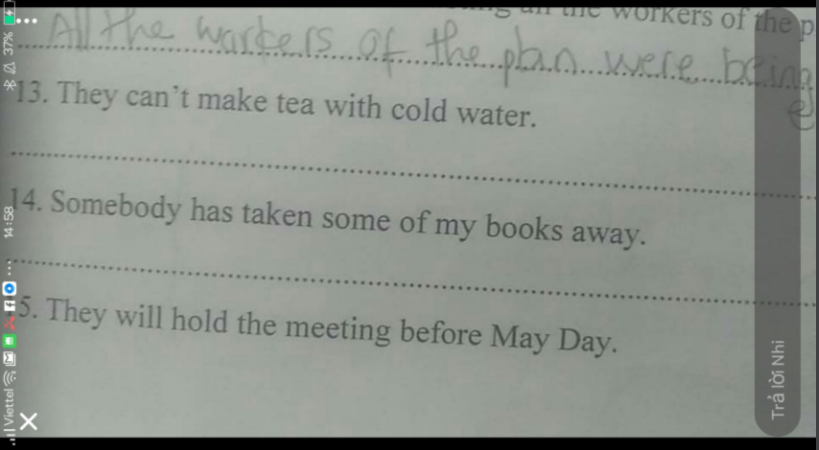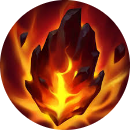Who made that mistake? chuyển sang bị động giúp em với

Những câu hỏi liên quan
Quy tắc chuyển từ câu chủ động sang câu bị động giúp em với ạ1Who invited her to the party? - The party be invited by who ? - The party was invited by whom ? - By whom the party was invited ? - By whom was the party invited? 2 When did they buy this car? 3 Was Mary helping her mother in the kitchen? 4 Will you invite her to your birthday party? 5 He cleans the house 6 He is cleaning the house 7 He has clean...
Đọc tiếp
Quy tắc chuyển từ câu chủ động sang câu bị động giúp em với ạ
1Who invited her to the party?
- The party be invited by who ?
- The party was invited by whom ?
- By whom the party was invited ?
- By whom was the party invited?
2 When did they buy this car?
3 Was Mary helping her mother in the kitchen?
4 Will you invite her to your birthday party?
5 He cleans the house
6 He is cleaning the house
7 He has cleaned the house
8 He cleaned the house
9 He was cleaning the house
10 He had cleaned the house
11 He should clean the house
12 He will clean the house
1Who invited her to the party? => By whom was her invited to the party
- The party be invited by who ?
- The party was invited by whom ?
- By whom the party was invited ?
- By whom was the party invited?
2 When did they buy this car?
When was this car bought?
3 Was Mary helping her mother in the kitchen?
Was her mother being helped by mary in the kitchen
4 Will you invite her to your birthday party?
Will she be invited to your birthday party?
5 He cleans the house
The house is cleaned by him
6 He is cleaning the house
The house is being cleaned by him
7 He has cleaned the house
THe house has been cleaned
8 He cleaned the house
THe house was cleaned by him
9 He was cleaning the house
THe house was being cleaned by him
10 He had cleaned the house
The house had been cleaned by him
11 He should clean the house
THe house should be cleaned by him
12 He will clean the house
THe house will be cleaned by him
Đúng 1
Bình luận (0)
Chuyển sang câu bị động:
1. They have built a new hospital near the ảiport
4. My mother has made that cake
5. They have just prepared the dinner
Chuyển sang câu bị động:
1. They have built a new hospital near the ảiport
=> a new hospital has been built near the airport
4. My mother has made that cake
=> that cake has been made by my mother
5. They have just prepared the dinner
=> the dinner has just been prepared
Đúng 0
Bình luận (0)
em chưa rõ về chuyển câu chủ động sang câu bị động, với câu wish. Mong giúp em
1) Form of Passive Cấu trúc câu bị động:
Subject + finite form of to be + Past Participle
(Chủ ngữ + dạng của động từ “to be” + Động từ ở dạng phân từ 2) Example: A letter was written.
Khi chuyển câu từ dạng chủ động sang dạng câu bị động:
Tân ngữ của câu chủ động chuyển thành chủ ngữ của câu bị động. Ví dụ: Active: He punished his child. -> Passive: His child was punished. (Anh ta phạt cậu bé.) (Cậu bé bị phạt)
Câu chủ động ở dạng thì nào, chúng ta chia động từ “to be” theo đúng dạng thì đó. Chúng ta vẫn đảm bảo nguyên tắc chủ ngữ số nhiều, động từ “to be” được chia ở dạng số nhiều, chủ ngữ số ít thì động từ “to be” được chia ở dạng số ít.
Present simple (Hiện tại đơn) The car/cars is/are designed.Present perfect (HT hoàn thành) The car/cars has been/have been designed.Past simple (Quá khứ đơn) The car/cars was/were designed.Past perfect (Qk hoàn thành) The car/cars had been/had been designed.Future simple (Tương lai đơn) The car/cars will be/will be designed.Future perfect (TL hoàn thành) The car/cars will have been designedPresent progressive (HT tiếp diễn) The car/cars is being/are being designed.Past progressive (Qk tiếp diễn) The car/cars was being/were being designed.2) WishWish ở hiện tại
Để diễn đạt một mong muốn ở hiện tại, chúng ta dùng cấu trúc:
S + wish + thì quá khứ .
Eg : I wish I knew the answer to this question. (at present i don't know the answer)
I wish I didn't have so much work to do . (I do have a lot of work)
2. Wish ở quá khứ
Để diễn đạt một mong muốn ở quá khứ, chúng ta dùng:
S + wish + The Past perfect.
Eg : I wish I had gone to your party last week. (I did not go).
3. Wish ở tương lai
+ Chúng ta có thể dùng "could" để diễn đạt mong muốn về một việc nào đó ở tương lai.
Eg : I wish Jane could meet me next week.
+ Chúng ta cũng có thể cùng "could" để diễn tả một việc nhìn chung rất khó có thể thực hiện, không khả thi.
Eg : I wish I could contact him, but I don't have my mobile phone with me.
+ Chúng ta cũng có thể dùng "have to" để nói về mong muốn một việc trong tương lai
Eg : I wish I didn't have to get up early tomorrow.
Đúng 0
Bình luận (0)
- Động từ wish được dùng để diễn tả một điều ước ở hiện tại, tương lai hoặc quá khứ.
- Có 3 dạng điều ước:
+ Điều ước ở hiện tại
+ Điều ước ở tương lai
+ Điều ước ở quá khứ
I. ĐIỀU ƯỚC Ở HIỆN TẠI
- Điều ước ở hiện tại được sử dụng để diễn tả một mong muốn không có thật ở hiện tại.
- Công thức:
Wish + Past Simple (quá khứ đơn)
Wish + Past Continuous (quá khứ tiếp diễn)
Ví dụ (1): I wish I had a car (In fact, I don’t have a car now).
(Tôi ước gì có một chiếc xe hơi. Thực tế tôi không có xe hơi).
Ví dụ (2): I wish it weren’t raining now (In fact, it is raining now).
(Tôi ước gì trời không mưa. Thực tế trời đang mưa).
* Chú ý: Với động từ TO BE “were” được dùng cho tất cả các ngôi. Tuy nhiên trong văn nói vẫn có thể dùng “was”
Ví dụ: I wish it wasn’t / weren’t raining now.
II. ĐIỀU ƯỚC Ở TƯƠNG LAI
- Điều ước ở tương lai được sử dụng để phàn nàn hoặc diễn tả một mong muốn trong tương lai.
- Công thức:
Wish + would / could + V
Wish + were going to + V
Ví dụ (1): I wish I could attend the course next month (In fact, I can’t attend).
(Tôi ước tôi có thể tham gia vào khóa học tháng tới. Thực tế tôi không thể tham gia).
Ví dụ (2): I wish I weren’t going to visit her next week (In fact, I am going to visit her next week).
(Tôi ước gì tuần tới tôi không đến thăm cô ấy. Thực tế tôi sẽ đến thăm cô ấy).
Ví dụ 3: I wish you wouldn’t put your clothes everywhere.
(Ước gì bạn không vứt quần áo lung tung nữa).
* Chú ý: điều ước ở tương lai thường có công thức:
A + wish + B + would / could + V
III. ĐIỀU ƯỚC TRONG QUÁ KHỨ
- Điều ước trong quá khứ được sử dụng để diễn tả một tình huống đã không xảy ra trong quá khứ.
- Công thức:
Wish + Past Perfect (quá khứ hoàn thành)
Wish + Past Perfect Continuous (quá khứ hoàn thành tiếp diễn)
Wish + Perfect Conditional (would / could / might + have + PP)
Ví dụ (1): I wish you had come to my birthday party (In fact, you didn’t come).
(Tôi ước cậu đã tham dự bữa tiệc sinh nhật của tôi. Thực tế cậu không đến).
Ví dụ (2): I wish I hadn’t been working for her at that time (In fact, I was working for her at that time)
(Tôi ước vào thời điểm đó không làm việc cho cô ấy. Thực tế tôi đang làm việc cho cô ấy)
Ví dụ (3): I wish you could have seen that film. (In fact, you couldn’t see that film).
(Ước gì bạn đã xem bộ phim đó. Thực tế bạn đã không xem).
IV. WISH + TO DO / WISH SB ST / WISH SB TO DO ST
Ví dụ: I wish to pass the exam (tôi ước gì mình sẽ đỗ kỳ thi đó)
I wish you happy birthday (chúc sinh nhật vui vẻ)
I wish you to become a good doctor (chúc cậu sẽ trở thành một bác sỹ giỏi).
V. IF ONLY
- If only (giá mà, giá như) có thể được dùng thay cho động từ wish nhưng mang sắc thái biểu cảm hơn.
Ví dụ: If only you were here. (Giá như giờ này anh ở đây).
Đúng 0
Bình luận (0)
Ex2: Chuyển các câu với động từ tường thuật sau sang câu bị động1. People believe that this new teaching method is more effective than the old one. This new teaching method ......2. It is expected that some solutions will be made Some solutions ........3. People think that climbing is a dan Climbing .......4. It is rumoured that the towers were built very long ago The towers .......5. People say that the cat likes catching big mice The cat .........6. It is said that the soldiers surrendered to...
Đọc tiếp
Ex2: Chuyển các câu với động từ tường thuật sau sang câu bị động
1. People believe that this new teaching method is more effective than the old one.
=> This new teaching method ......
2. It is expected that some solutions will be made
=> Some solutions ........
3. People think that climbing is a dan
=> Climbing .......
4. It is rumoured that the towers were built very long ago
=> The towers .......
5. People say that the cat likes catching big mice
=> The cat .........
6. It is said that the soldiers surrendered to the enemy.
=> The soldiers ...........
7. People know that the man put up with his wife too much.
=> The man .......
8. They think that he has died a natural death.
=> He________________________________
1. People believe that this new teaching method is more effective than the old one.
=> This new teaching method ......is believed to be more effective than the old one.
2. It is expected that some solutions will be made
=> Some solutions ........are expected to be made
3. People think that climbing is a dan
=> Climbing .......is thought to be a dan
4. It is rumoured that the towers were built very long ago
=> The towers .......are rumoured to have been built very long ago
5. People say that the cat likes catching big mice
=> The cat .........is said to like catching big mice
6. It is said that the soldiers surrendered to the enemy.
=> The soldiers ...........are said to have surrendered to the enemy.
7. People know that the man put up with his wife too much.
=> The man .......is known to have put up with his wife too much.
8. They think that he has died a natural death.
=> He__is thought to have died a natural death.______________________________
Đúng 2
Bình luận (0)
Chuyển sang câu bị động:
1. Did you notice them swimming in pool?
2. He made me wash shoes carefully
3. They say that he worked 2 years ago
1 Were they noticed to swim in pool?
2 I was made to wash shoes carefully
3 It is said that he worked 2 years ago
Đúng 0
Bình luận (0)
mn lm giúp em với ạ. đề bài chuyển sang câu bị động ạ 
13 Tea can't be made with cold water
14 Some of my books have been taken away
15 The meeting will be held before May Day
Đúng 2
Bình luận (0)
13 TEA CAN'T BE MADE WITH COLD WATER
14SOME OF MY BOOKS HAVE BEEN TAKEN AWAY
Đúng 1
Bình luận (1)
Xem thêm câu trả lời
Chuyển câu sang bị động giúp em với 7. I drank beer-> 8. She ate apples->
7. Beer was drunk by me yesterday.
8. Apples were eaten by her
Đúng 1
Bình luận (2)
7. I drank beer-> Beer was drunk by me yesterday. 8. She ate apples->Apples were eaten by her
Đúng 0
Bình luận (0)
Chuyển sang bị động
1) The factory will prodice 10,000 cars next year.
2)People think that the computer was made in USA( Same height)
1) The factory will prodice 10,000 cars next year.
=> 10,000 cars will be produced by the factory next year
2)People think that the computer was made in USA( Same height)
=> It is thought that the computer was made in USA
The computer is thought to have been made in USA
Mình nghĩ thế..
Đúng 0
Bình luận (0)
1, 10,000 cars will be prodice by the factory next year
2, It is thought that the computer was made in USA
Chúc bạn học tốt ![]()
Đúng 0
Bình luận (0)
chuyển câu chủ động sang câu bị động we had thought carefully before we gave our decision. giúp em với ạ...
![]()
We had thought carefully before our decision was given out
Đúng 2
Bình luận (1)


























